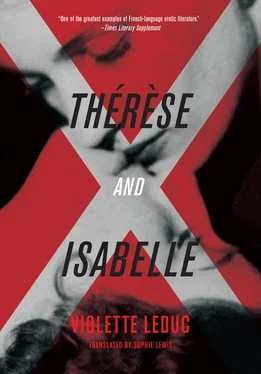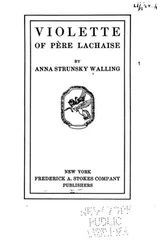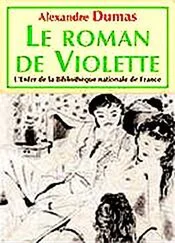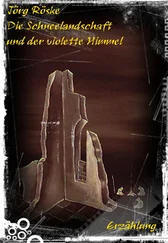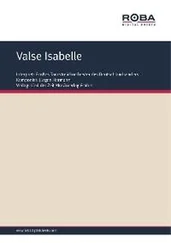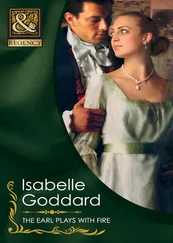She pulled me back into her box, she encircled me anew while I pretended to resist her. It was the first time that she clasped me to her standing up.
We listened to the vortex of heavenly bodies deep within us, we watched the shadows whirling in the dormitory.
I brought Isabelle back from a chilly winter seafront, I drew back the sheets, showed her the way:
“It is late. Sleep. I was wrong just now: you must sleep.”
“No!”
“You’re yawning.”
“Come closer. I want to see you.”
The flashlight was hurting her eyes. Soon that slack mask would cover her face.
“Don’t sleep. .”
“I promise I won’t.”
I wait, I watch her. I wait: the spider spins deep inside me, the spider will pounce at my sex if I don’t ask. . What is there to ask?
She wonders how long I will last with her drug in my eyes. Our complicity shudders between us, sends waves, while my judge silently judges the future’s kisses and caresses. I look at her as I look at the sea in the evening when I can no longer see it.
“It’s time to go,” says Isabelle.
We would rise at half past six. The monitors would push the curtain rings along their rails, coming into our cells to see that we were up. We would strip our beds, wash in cold water while our mattresses grew cold, remake our beds once we had dressed. At a quarter to seven, the girl on duty would open the cupboard, take out the dustpan and broom, clean her cell, leave the broom outside her neighbor’s box. At twenty-five past seven, the monitor inspected our combs, at twenty-five past seven we made sure our hands and nails were impeccable, at twenty-five past seven the bell would ring: we lined up in the passage and went down the stairs two by two. At half past seven we put our shoes on in the shoe room, at seven thirty-five we broke out of our pairs in the hall and formed groups according to our own alliances. At seven forty the porter rang the bell once. The girls lined up in the hall. We would go as far as the refectory, take earthenware pitchers from their rack, butter symmetrical pieces of bread. At ten to eight the headmistress came in. We put down our buttered bread, we stood to attention. At eight o’clock the head monitor clapped her hands. We would rise from the tables, replace the pitchers, push our chairs in against the table, sweep our crumbs into our bowls, and line up two by two in the passage. Girls flew off toward their violins, their primers, their pianos. We took a few turns around the schoolyard, lined up once again to go up to the study room, took our books from our lockers, and studied until half past eight.
On Monday morning I made a solemn entrance into the refectory, with Isabelle on my right: we were progressing down the great aisle of a photographer’s salon on our wedding day. I stepped around some bouquets of white flowers and sat down. In fact, she wasn’t following me. My wedding ended in a billow of chattering, in the disquieting flavor of milky ersatz coffee sweetened with saccharin. I had been torn from her, my ribs ached. She ignored me in the passage, she lingered in bleached strips of sunlight as it filtered through the windows. I looked at the vase on the table, I wanted it as fortification.
“I wish you would look at me when I’m looking at you,” she said behind me.
She lifted the bread basket, put it back in the same place; she walked off nonchalantly, her hands loosening the belt around her slim waist.
She buttered some pieces of bread, stuck the halves together, pulled them open, looked at them, she wasn’t eating. She leaned on her elbows, she turned toward a girl who was talking to her.
I know the secret of that thick-coiled hair, I know those two great tortoiseshell hairpins lying on her nightstand. I am looking at you, I am looking at you, my eyes call out to her. The whip of her long, loose hair last night whips through my insides hazily. What am I guilty of? ask her coaxing eyes. I cannot tell her that from here her arms’ aroma is lily of the valley; her twisted hair, of midday’s loaves in the bakers’ baskets; her cheek, of elder after the rain; my lips, of the Noirmoutiers marshes’ salt; her throat, of the shadowy scent of black currants.
I glimpse that Isabelle has folded her napkin, tossed her bowl to the devil. I asked the girl if I might do her duty for her. I collected the dishes, I ate the crumbs left in Isabelle’s bowl and, amidst the general indifference, I fed myself on the slops.
Her chair fell backward, Isabelle was hysterical at the table, the head monitor ran to her. Girls stood up, surrounded Isabelle. I had no right to approach her: I was no longer innocent.
The monitor was stroking her hair, she was whispering into her ear in front of the sheepish girls. I felt cast off. “What is the matter?” hummed the red-haired monitor. Two kneeling girls were stroking her hand, touching her breast, edging toward her heart.
She will die, for the whole school is pawing at her!
“Does lemon bleach your hands?” I ask my neighbor at the table.
I say things I’m not thinking. Don’t let her die. She will not die. We two are immortals. What an affront, if she should die.
“Isabelle is ill,” I say.
“Faking it,” says the girl.
“Isabelle is ill. Shut up.”
I’ll cut their goody-goody hands from around her shoulders. I’ll cut them off.
Isabelle lifted her head. She said:
“I don’t know what was wrong with me.”
The monitor, the girls dropped back. I went up to her:
“What was wrong with you?”
“Needing you.”
The girls rose and reformed their lines. Isabelle touched her finger to my shoulder. The touch meant: I’ll tell if you tell; I’ll stumble if you stumble; I shall waste away if you waste away.
I stood beside her: my elbow fit perfectly into her palm. She gave the ghost of an embrace; the girls were dispersing. We were still walking in step; we wanted space and solemn distance to keep us apart. Yes, we wanted to be ceremonial in the playground. She drew away.
Images scattered around Isabelle as she drew away: the birdsong in our treeless courtyard was a cool shaft marking the day’s beginning, the song suggested clearings on the outskirts of towns; Isabelle was drawing away. I wanted to be stone, a stone with holes for eyes. I thought I would cure myself of her by looking at the sky; I followed the shifting of the monster stretched out across it: a fraying, the figure of a skier drawn on a blue ground with a pencil of snow. A figure I had not seen taking shape. The monster perished as I observed it, the bird fell silent, Isabelle disappeared; where the cloud had been, the recast sky looked like an oil painting’s monotone background. Smaller girls were stamping in the dust. The bird took up its song again, ending with a limp spray of fireworks; the little girls jumped at Isabelle’s neck, dragged her off with them. I cursed her lightness, I cursed my seriousness. She was dissolving away into a group, in a shrieking schoolyard. Of that walking corpse I could still just see her rope of hair.
I was wandering alone around the lavatories. I went in. The air smelled midway between the chemical odors of a sweet factory and of school disinfectant. I no longer hated the efflux of disinfection that caught in our throats those evenings we returned to school. The smell was the backdrop to our encounter. The wild children’s screams faded. A haze rose up from the frequently scrubbed, light, wooden seat: the hazy tenderness of a mass of flaxen hair. I leaned over the bowl. The still water reflected my face before the creation of the world. I touched the handle, the chain, I took my hand away. The chain swung next to the sad water. Someone called me. I didn’t dare to put the hook across and lock myself in.
Читать дальше
